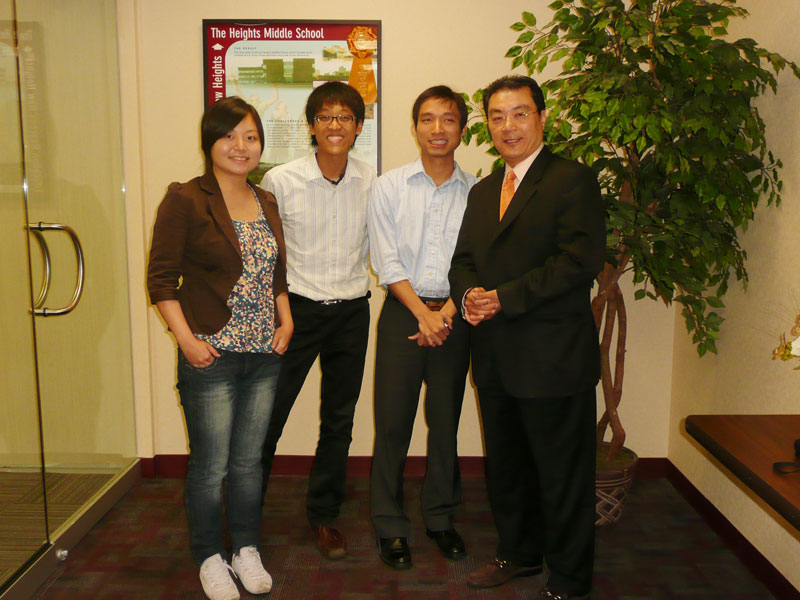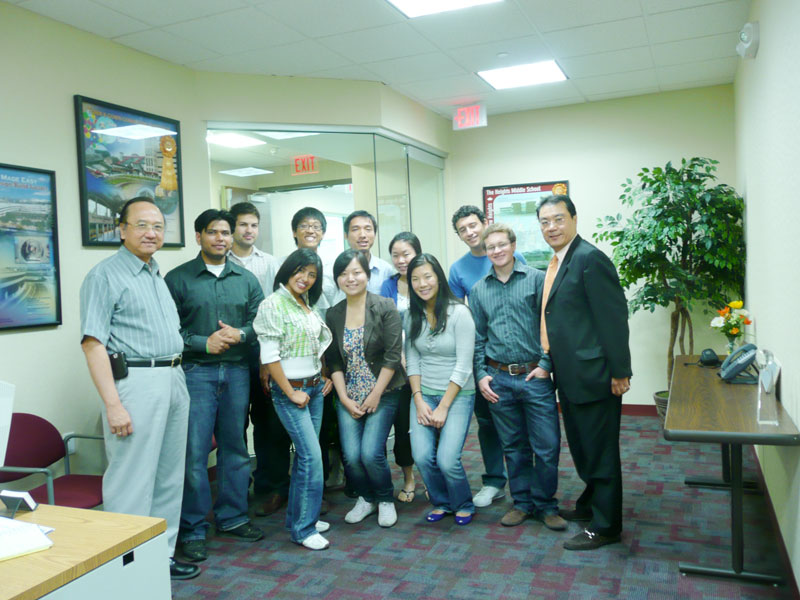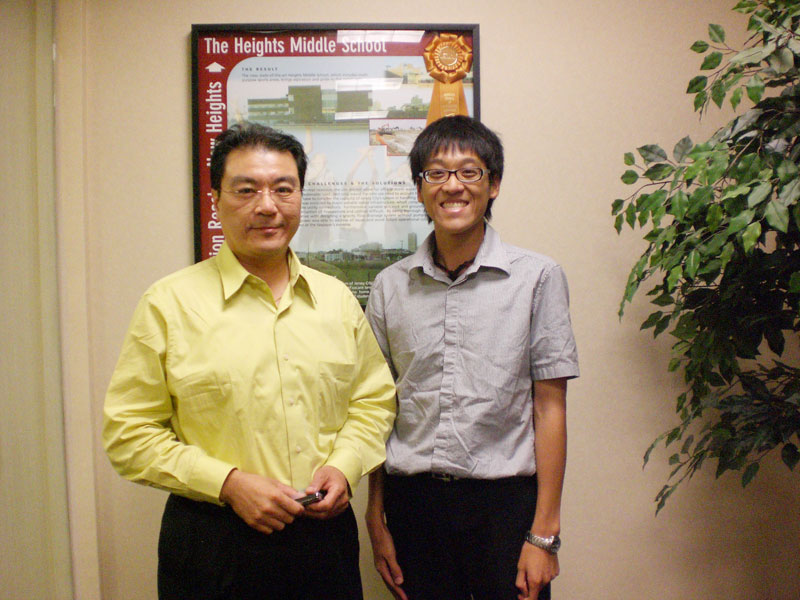Photo Gallery > BridgeUSA-FUSIA’s J-1 Internships
Vision of nurturing the future
Copyright (c) 2025 | All rights reserved | FUSIA Communications
2025202420232020201920182017201620152014201320122011201020092008ReturnNYEPSelf-PlacedCCIP NYC (Hosts)CCIP NYC (Activities)NewsAccolades
Vision of nurturing the future
Published on 2008-07-01
Founded in 1992 by K. Peter Yu as a geotechnical consulting firm, YU & Associates, Inc. (YU) has since grown into a diversified engineering company with proven accomplishments in transportation, education, health care facilities and urban redevelopment for public and private sector clients. YU is certified as a Minority Business Enterprise (MBE) and a Disadvantaged Business Enterprise (DBE) with numerous state and local agencies.
Today, YU provides specialty services in geotechnical, civil and environmental engineering continuing its mission to provide responsive and quality services. Many of YU’s projects have been awarded engineering excellence in the engineering and construction industries. YU has also taken it upon itself to nurture interns from Asia and around the world. In this interview, we will explore the vision of Mr. Andrew Leung, Executive Vice President of YU and ask him to share with us his thoughts on his decision to embark on this journey.
Q: Andrew, before we get to your thoughts, could you tell me more about yourself, your management style and how it has brought YU & Associates to where it is today?
I have practiced Geotechnical Engineering for 27 years. I left Hong Kong at the age of sixteen to complete my high school and college education in the UK. Being just sixteen and on my own, it took time to adjust, but after about four months, I had built a strong network of friends. Upon graduation, I was given the opportunity from the UK government to complete an exchange program at the University of Illinois at Urbana Champaign. My experience had taught me to be resourceful, adaptive, and independent. Moreover, it taught me to respect diversity.
The core of my management style is a knowledge-based influence style, using the non-authoritarian approach. I believe trust, respect and communication are paramount. I nurture my staff by encouraging them, by supporting them, by persuading them and by listening to them.
Q: What made you decide to take part in the FUSIA/CCIP internship program?
A: As a product of a successful exchange student program, I strongly believe that the FUSIA/CCIP program can give back to the people it embraces. I also believe in the diversity the program encourages. Last year, we only took on US students from many great American universities. Schools such as Cooper Union, Columbia, Cornell, Boston University, the University of Illinois at Urbana Champaign, the New Jersey Institute of Technology do have their unique cultures. However, this year we have decided to expand our horizons to include great universities from all of Asia. This not only provides opportunities for Asian students to gain work experience in the US, but it also allows our company to be exposed to a global culture.
Q: Having worked with Asian students during this period, what do you think of Asian students in general?
A: Asian students are very good people to work with as they have a huge sense of responsibility and tend to follow rules very closely. I only wish they were more curious. I always encourage them to ask why something is the way it is. There is no doubt in my mind that Asian students are already excellent performers, but if we can get them to ask for the reasons behind the tasks they perform, it would grant them stronger decision-making power. This will bring great benefit to them in the long run.
Q: Do you believe that this whole experience has benefited your company? Has it benefited you personally?
A: Definitely. Taking on interns and integrating them into the program is our contribution to society. It is also part of our company's plan to nurture the next generation. We believe that what we are doing here is truly meaningful. From a personal standpoint, this opportunity gives me a chance to have an impact on someone else's life. If I may, I'll give you an example: we had an Asian student from a local university last year who was extremely reserved. At the beginning of the internship, we asked him to set objectives for what he wanted to accomplish. At the end of the program, he was able to communicate assertively with people from all walks of life, from colleagues to construction engineers. Our team is very proud of him and is amazed with his transformation.
Q: How do you train these students and decide the type of tasks that will be allocated to them? Have you ever had any reservations?
A: In the beginning, we seek out and encourage students to identify their unique strengths. Tasks are specifically assigned according to the students' individual strengths. From there, we work with interns on a one-on-one basis to identify and work on where improvement is needed. We do so by setting goals. I also encourage interns to read books such as Stephen Covey's The 7 Habits of Highly Effective People and The Eighth Habit: From Effectiveness to Greatness, as well as John Kotter's Leading Change. Through these books we are able to broaden the scope of their learning.
In fact, my hiring process is no different. I hire those who have passion, who are eager to learn, and who have the potential to grow beyond me.
Q: Can you give us an idea of what it was like working with these students?
A: When working with a diverse group of people with different upbringings and culture, one is always presented with certain challenges. However, we strive to teach the students to look at others' strengths and learn from them. This way, the students learn to take full advantage of diversity and are able to see the fruits of synergy. Along with learning how to synergize, this internship program also allows them to gain true work experience in the industry. When working with these students, I expect them to demonstrate their interest in learning and eagerness to excel.
Q: In your vision, what does the future hold for Yu & Associates, particular for its interns?
A: I would love to see the interns grow as a group, much akin to watching a caterpillar go through the stages which eventually change it into something completely different and even better than what it was before. Furthermore, I would also like to witness raw intelligence mixed with technical skills in a team setting. YU wants to produce dynamic teams of interns who can provide the best service to clients in the future. We want our interns to become groups of extraordinary achievers and future business leaders who one day will continue the tradition of nurturing future generations.
All the interns and staff of YU & Associates simply call him Andrew: it is not often that you can call your supervisor by his first name. Through this interview, I have seen Andrew's sincerity in cultivating an environment within his firm that fosters learning and growth through the appreciation of diversity. Likewise, his special kind of spirit is directly reflected in his management style and has touched all who have crossed his path.
Today, YU provides specialty services in geotechnical, civil and environmental engineering continuing its mission to provide responsive and quality services. Many of YU’s projects have been awarded engineering excellence in the engineering and construction industries. YU has also taken it upon itself to nurture interns from Asia and around the world. In this interview, we will explore the vision of Mr. Andrew Leung, Executive Vice President of YU and ask him to share with us his thoughts on his decision to embark on this journey.
Q: Andrew, before we get to your thoughts, could you tell me more about yourself, your management style and how it has brought YU & Associates to where it is today?
I have practiced Geotechnical Engineering for 27 years. I left Hong Kong at the age of sixteen to complete my high school and college education in the UK. Being just sixteen and on my own, it took time to adjust, but after about four months, I had built a strong network of friends. Upon graduation, I was given the opportunity from the UK government to complete an exchange program at the University of Illinois at Urbana Champaign. My experience had taught me to be resourceful, adaptive, and independent. Moreover, it taught me to respect diversity.
The core of my management style is a knowledge-based influence style, using the non-authoritarian approach. I believe trust, respect and communication are paramount. I nurture my staff by encouraging them, by supporting them, by persuading them and by listening to them.
Q: What made you decide to take part in the FUSIA/CCIP internship program?
A: As a product of a successful exchange student program, I strongly believe that the FUSIA/CCIP program can give back to the people it embraces. I also believe in the diversity the program encourages. Last year, we only took on US students from many great American universities. Schools such as Cooper Union, Columbia, Cornell, Boston University, the University of Illinois at Urbana Champaign, the New Jersey Institute of Technology do have their unique cultures. However, this year we have decided to expand our horizons to include great universities from all of Asia. This not only provides opportunities for Asian students to gain work experience in the US, but it also allows our company to be exposed to a global culture.
Q: Having worked with Asian students during this period, what do you think of Asian students in general?
A: Asian students are very good people to work with as they have a huge sense of responsibility and tend to follow rules very closely. I only wish they were more curious. I always encourage them to ask why something is the way it is. There is no doubt in my mind that Asian students are already excellent performers, but if we can get them to ask for the reasons behind the tasks they perform, it would grant them stronger decision-making power. This will bring great benefit to them in the long run.
Q: Do you believe that this whole experience has benefited your company? Has it benefited you personally?
A: Definitely. Taking on interns and integrating them into the program is our contribution to society. It is also part of our company's plan to nurture the next generation. We believe that what we are doing here is truly meaningful. From a personal standpoint, this opportunity gives me a chance to have an impact on someone else's life. If I may, I'll give you an example: we had an Asian student from a local university last year who was extremely reserved. At the beginning of the internship, we asked him to set objectives for what he wanted to accomplish. At the end of the program, he was able to communicate assertively with people from all walks of life, from colleagues to construction engineers. Our team is very proud of him and is amazed with his transformation.
Q: How do you train these students and decide the type of tasks that will be allocated to them? Have you ever had any reservations?
A: In the beginning, we seek out and encourage students to identify their unique strengths. Tasks are specifically assigned according to the students' individual strengths. From there, we work with interns on a one-on-one basis to identify and work on where improvement is needed. We do so by setting goals. I also encourage interns to read books such as Stephen Covey's The 7 Habits of Highly Effective People and The Eighth Habit: From Effectiveness to Greatness, as well as John Kotter's Leading Change. Through these books we are able to broaden the scope of their learning.
In fact, my hiring process is no different. I hire those who have passion, who are eager to learn, and who have the potential to grow beyond me.
Q: Can you give us an idea of what it was like working with these students?
A: When working with a diverse group of people with different upbringings and culture, one is always presented with certain challenges. However, we strive to teach the students to look at others' strengths and learn from them. This way, the students learn to take full advantage of diversity and are able to see the fruits of synergy. Along with learning how to synergize, this internship program also allows them to gain true work experience in the industry. When working with these students, I expect them to demonstrate their interest in learning and eagerness to excel.
Q: In your vision, what does the future hold for Yu & Associates, particular for its interns?
A: I would love to see the interns grow as a group, much akin to watching a caterpillar go through the stages which eventually change it into something completely different and even better than what it was before. Furthermore, I would also like to witness raw intelligence mixed with technical skills in a team setting. YU wants to produce dynamic teams of interns who can provide the best service to clients in the future. We want our interns to become groups of extraordinary achievers and future business leaders who one day will continue the tradition of nurturing future generations.
All the interns and staff of YU & Associates simply call him Andrew: it is not often that you can call your supervisor by his first name. Through this interview, I have seen Andrew's sincerity in cultivating an environment within his firm that fosters learning and growth through the appreciation of diversity. Likewise, his special kind of spirit is directly reflected in his management style and has touched all who have crossed his path.
Copyright (c) 2025 | All rights reserved | FUSIA Communications



